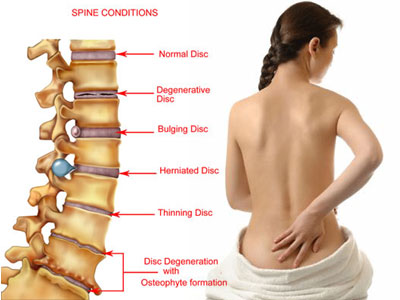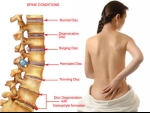
Myth: The Spine Is Delicate And Easily Injured.
Fact: The spine and its surrounding muscles, tendons, and ligaments comprise a well-designed structure that’s incredibly strong, flexible and supportive. To help maintain the back and spine, proper conditioning is needed - including strengthening, flexibility and aerobic conditioning. While there are some exceptions to the rule (such as an unstable spinal fracture), the back does not need to be overprotected after recovering from a typical episode of back pain.
Myth: If I Have Back Pain And Back Problems When I Am Young, It Will Get Worse As I Age.
Fact: The incidence of back pain is actually highest between the ages of 35 and 55. After age 55, people usually have less pain - especially disco genic pain (back pain or other pain or symptoms caused by disc problems). While disc degeneration is a natural part of the aging process, it is not always accompanied by pain.
Myth: My Father (Or Mother) Had Bad Back Pain And Back Problems So I’m Likely To Have It.
Fact: For the vast majority of conditions related to back and neck pain, there is no genetic predisposition, which means that parents do not pass their back conditions onto their children.
Myth: An MRI Scan Or Other Diagnostic Test Is Needed To Diagnose My Back Problem.
Fact: Most health professionals can develop a successful treatment approach based on a thorough medical history and physical examination. Only specific symptom patterns in a minority of cases indicate the need for an MRI scan or other sophisticated tests. Typically, an MRI scan is used when patients are not responding to appropriate back pain treatment.
Myth: The Abnormality/Back Problem On My MRI Scan Needs To Be Cured.
Fact: An abnormality that is seen on an imaging test (MRI, CT scan) does not necessarily cause back pain or other symptoms. In fact, the vast majority of people who never have had an episode of low back pain will have abnormalities (such as a herniated disc or degenerative disc) on an imaging test. For patients experiencing low back pain, 92%-96% can be treated successfully without back surgery.
Myth: If no specific back problem is found, my pain must be psychological.
Fact: Most cases of back pain will not follow the typical medical approach of specific structural diagnosis and remedy, but the pain is still real. While psychological factors, such as depression and sleeplessness will often need to be included as part of a comprehensive treatment program for back pain, there are also a variety of nonsurgical care options that can help alleviate the back pain. Additionally, a qualified spine specialist to rule out serious problems such as tumor or infection should investigate persistent back pain symptoms.
If you are suffering from pain, please contact our office at (516) 419-4480 or (718) 215-1888 to arrange an appointment with our Interventional Pain Management Specialist, Dr. Jeffrey Chacko.













